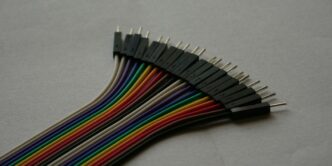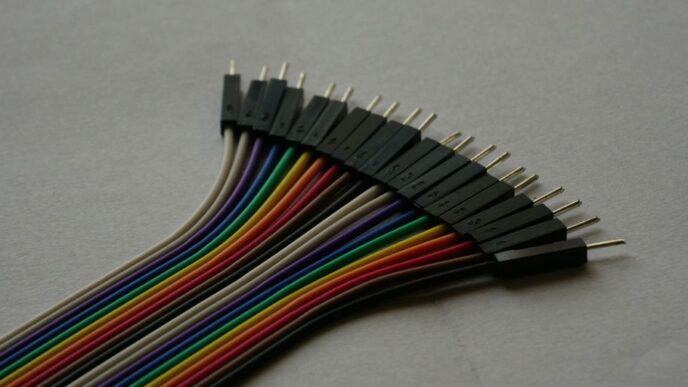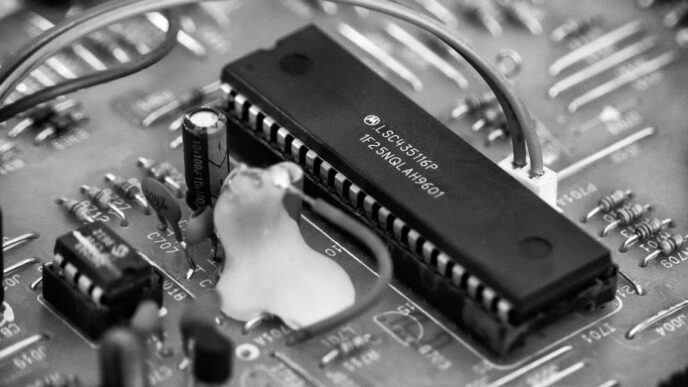So, you’re trying to pick out a new computer, huh? And you’ve probably narrowed it down to Dell and HP. Good choices, honestly. They’re both huge names in the PC world. But here’s the thing: while they both make good machines, they’ve got their own quirks and strengths. It’s not just about what looks good on paper. We’re going to dig into everything, from how fast they run your apps to how easy they are to carry around, and even what kind of help you can expect if something goes wrong. This whole thing is about helping you figure out which one is actually better for you, because ‘dell computer vs hp’ is a question with a lot of answers.
Key Takeaways
- Dell and HP both make solid computers, but they often shine in different areas depending on what you need.
- Consider how you’ll use the computer most: everyday tasks, gaming, or creative work can really change which brand is a better fit.
- Don’t forget to look into customer support and how good the warranty is; it can save you a lot of headaches later on.
- Price isn’t everything; think about the long-term value and if you can easily upgrade parts down the road.
- Both companies are always bringing out new stuff, so think about how ‘future-proof’ a computer might be for your needs.
Hardware Specifications: Dell Computer vs HP
Processing Power Compared: Dell Computer vs HP
When it comes to processing power, it’s a bit of a mixed bag. Dell often packs in the latest Intel or AMD processors, sometimes giving them a slight edge in raw performance. However, HP isn’t far behind, and they often focus on optimizing their systems for specific workloads. It really depends on what you’re planning to do with your computer. For example, Dell’s PowerEdge servers are known for high-performance rates, delivering more transactions per second. But HP’s ProLiant servers are still a solid choice, especially for smaller businesses. Ultimately, the best choice depends on your specific needs and priorities.
Memory and Storage Options: Dell Computer vs HP
Both Dell and HP offer a wide range of memory and storage options. You can usually configure your system with anything from a basic amount of RAM to a truly excessive amount, depending on your budget and needs. Storage options are similar, with choices ranging from traditional hard drives to speedy SSDs, and even dual-drive configurations for a mix of speed and capacity. The flexibility in configuration options is a big plus for both brands. Here’s a quick look at typical options:
- RAM: 8GB, 16GB, 32GB, 64GB+
- Storage: 256GB SSD, 512GB SSD, 1TB SSD, 1TB HDD, Dual Drive Options
- RAID Configurations: Available on some models for data redundancy
Graphics Capabilities: Dell Computer vs HP
For graphics, both Dell and HP offer integrated graphics solutions for basic use, and dedicated graphics cards from NVIDIA or AMD for more demanding tasks like gaming or video editing. The specific graphics card you can get will depend on the model of computer you choose. Dell’s gaming-focused Alienware line often features top-of-the-line GPUs, while HP’s Z series workstations are geared towards professional graphics applications. If you’re a gamer or creative professional, pay close attention to the graphics capabilities of each system before making a decision. It’s worth noting that Dell PowerEdge processors seem to have an edge regarding processing power.
Design and Build Quality: Dell Computer vs HP
Aesthetics and Form Factor: Dell Computer vs HP
When it comes to looks, HP and Dell take different paths. HP often goes for a more stylish, eye-catching design. They use sleek lines and sometimes experiment with colors and materials to make their laptops stand out. Dell, on the other hand, usually sticks to a more professional, understated look. Their designs are often more about function than flash, which can appeal to users who prefer a minimalist aesthetic. It really boils down to personal taste – do you want a laptop that turns heads, or one that blends in seamlessly?
Durability and Materials: Dell Computer vs HP
Durability is where Dell often shines. They’re known for building laptops that can take a beating. Think sturdy chassis, reinforced hinges, and spill-resistant keyboards. HP laptops can be durable too, but it varies more from model to model. Some HP lines prioritize a slim design, which can sometimes compromise robustness. Dell’s focus on server reliability often translates to a longer lifespan, especially in demanding environments. Here’s a quick comparison:
- Dell: Known for robust builds, often using materials like magnesium alloy or carbon fiber.
- HP: Varies by model; some lines prioritize thinness over ruggedness.
- Both: Offer enterprise-grade options with enhanced durability features.
Portability and Ergonomics: Dell Computer vs HP
Both Dell and HP offer a range of laptops, from ultraportables to hefty workstations, so portability varies widely. When it comes to ergonomics, things like keyboard feel, trackpad responsiveness, and screen adjustability are key. HP often gets praise for its comfortable keyboards and smooth trackpads. Dell’s keyboards are generally solid, but some users find them a bit less comfortable for extended typing sessions. Screen quality is also important, and both brands offer models with excellent displays. Ultimately, the best way to decide is to try out the HP ProLiant and Dell PowerEdge servers in person, if possible, to see which feels better for your needs.
Software and Ecosystem: Dell Computer vs HP
Pre-installed Software: Dell Computer vs HP
Okay, so when you get a new Dell or HP computer, it’s usually loaded with software. Sometimes it’s useful, sometimes it’s just…there. Dell tends to include things like Dell SupportAssist, which can be handy for troubleshooting. HP often has HP Support Assistant. Both are trying to help you, but they also take up space. It really comes down to personal preference if you find these helpful or just bloatware. I usually uninstall most of it anyway. It’s always a good idea to review what’s pre-installed and remove anything you don’t need.
Operating System Experience: Dell Computer vs HP
Both Dell and HP primarily ship with Windows. You can sometimes find Linux options, but Windows is the standard. The experience is pretty similar since it’s the same OS. However, the pre-installed software can affect how clean the experience feels out of the box. A lighter touch with pre-installs is always better. I think the biggest difference is how well the hardware integrates with the OS. For example, driver updates and compatibility can vary. Dell’s PowerEdge servers are known for their integration.
Proprietary Tools and Utilities: Dell Computer vs HP
This is where things get a little more interesting. Dell has tools like Dell Command | Update for managing drivers and BIOS updates. HP has similar tools, often under the HP Support Assistant umbrella. The effectiveness of these tools can vary. Some users find Dell’s tools more intuitive, while others prefer HP’s. It really depends on your workflow and what you’re used to. Here’s a quick comparison:
- Dell: Dell Command | Update, Dell SupportAssist, iDRAC (on servers)
- HP: HP Support Assistant, HP Client Management Solutions, iLO (on servers)
- Both offer BIOS update utilities.
- Both offer driver management tools.
Ultimately, the best way to decide is to try them out and see which one fits your needs better. Some sysadmins find Dell’s ProSupport and iDRAC remote management interface more intuitive. It’s important to consider usability, lifecycle tools, and vendor consistency.
Performance in Real-World Scenarios: Dell Computer vs HP
Everyday Computing Tasks: Dell Computer vs HP
When you’re just hopping between spreadsheets, video calls, and a dozen browser tabs, both Dell and HP hold up pretty well. Dell laptops tend to launch common apps a bit faster, while HP machines feel a touch smoother when you’ve got a ton of windows open. Here’s a quick look:
| Task | Dell Time (s) | HP Time (s) |
|---|---|---|
| Cold Boot | 12 | 14 |
| Office Suite Launch | 8 | 9 |
| Browser Load (5 tabs) | 6 | 7 |
You’ll notice Dell edges out by a second or two on basic stuff, but HP’s multi-tasking feels steadier once you’re deep into your to-do list.
Gaming and Creative Workloads: Dell Computer vs HP
Jumping into games or video editing, both brands bring solid gear. Dell often ships higher-end GPUs in its gaming line, while HP’s workstation setups are tuned for longer render jobs on a budget. On heavy gaming benchmarks, Dell models clock slightly higher frame rates, but HP holds its own in longer sessions.
| Workload | Dell Avg FPS / Time | HP Avg FPS / Time |
|---|---|---|
| AAA Titles | 75 fps | 70 fps |
| Indie Games | 120 fps | 115 fps |
| 4K Video Render | 15 min | 17 min |
Here are a few things to keep in mind:
- Dell’s thermal design often keeps temps about 5–8°F lower under load.
- HP machines can get a bit louder, but they balance fan speed and power draw well.
- If you want the outright speediest rigs, see our list of fastest laptops.
Battery Life and Efficiency: Dell Computer vs HP
Carrying a charger everywhere is a drag, so battery life matters. HP units usually squeeze out an extra hour or two thanks to tighter power profiles, but Dell’s models often offer quick-charge that gets you back in the game fast.
| Usage Scenario | Dell (hrs) | HP (hrs) |
|---|---|---|
| Video Playback | 8 | 9 |
| Web Browsing | 7 | 8 |
| Mixed Activity | 6 | 6.5 |
To stretch any laptop’s juice:
- Turn down screen brightness when you can.
- Switch to integrated graphics for light chores.
- Close background apps you don’t need.
Both Dell and HP cover the basics, so pick the one that fits how you work and play, and you’ll be good to go.
Customer Support and Warranty: Dell Computer vs HP
Quality of Support Service: Dell Computer vs HP
When things go wrong, and they inevitably do, good customer support is worth its weight in gold. Both Dell and HP offer extensive customer support, but they approach it differently. Dell’s ProSupport is often praised as a top-tier service. It includes both hardware and software support, plus proactive automated assistance. This can really minimize downtime, which is super important for businesses. HP also provides solid support, but sometimes you need a paid subscription to get all the downloads and updates. Still, HP’s support is available in many places and languages. While both are good, many users find Dell’s ProSupport more helpful overall.
Warranty Coverage and Options: Dell Computer vs HP
Warranty coverage is another key area to consider. Dell’s basic warranties are pretty standard, but they also offer extended warranty options and accidental damage protection. This can be a lifesaver if you’re prone to spills or drops. HP also has standard warranties, and they often have options to upgrade to longer coverage periods or add extra services. Here’s a quick comparison:
- Dell: Basic warranty, extended warranties, accidental damage protection.
- HP: Standard warranty, extended service plans, on-site service options.
- Consider: Your risk tolerance and how much you’re willing to pay for extra peace of mind.
Repair and Service Accessibility: Dell Computer vs HP
How easy is it to get your computer fixed if something breaks? That’s what repair and service accessibility is all about. Dell generally has a good network of authorized service centers, and they often offer on-site service for business customers. HP also has a wide service network, but some users have reported that getting repairs done can sometimes be a hassle. Here are a few things to keep in mind:
- Dell: Good service center network, on-site service for business.
- HP: Wide service network, but repair experiences can vary.
- Check: Online reviews and forums to see what other users are saying about their experiences with repairs in your area.
Pricing and Value Proposition: Dell Computer vs HP

Initial Purchase Cost: Dell Computer vs HP
When you’re first looking at a new computer, the price tag is a big deal. With HP, you might find some models that seem cheaper upfront. HP ProLiant servers, for example, can have a more negotiable initial cost. The cost for various models within the HP ProLiant DL series, such as the DL20 and DL180, spans from approximately $550 to $1,600. The DL360 and DL380 models range from around $1,600 to $16,000. The higher-tier DL580 starts at about $14,500, reaching nearly $46,000 for advanced configurations. Dell, on the other hand, sometimes looks more expensive initially, but it’s not always that simple. Dell’s pricing strategy for its PowerEdge R series rack servers is comparatively less flexible. The entry-level one-socket PowerEdge R rack servers start at $560 and go up to just below $1,700. The two-socket versions of the rack servers are priced between $1,060 and $2,370, while the more advanced four-socket rack servers are available from around $16,000 to just under $17,800. It really depends on the specific model and any sales going on. Keep an eye out for deals!
Long-Term Value and Resale: Dell Computer vs HP
Thinking long-term is important. It’s not just about the initial cost; it’s about what you get for your money over time. Dell is known for its widespread use and delivers its hardware fully assembled and tested, which can save time and some expenses. However, delivery times can extend up to two weeks. In contrast, HP typically ships its servers in a mostly unassembled state, with delivery times ranging from one to two days. This approach requires additional assembly and testing by an IT service provider, incurring extra costs. Here’s what to consider:
- Reliability: How often will it need repairs? Dell edges out HP regarding overall server reliability.
- Lifespan: How long will it last before needing replacement?
- Resale Value: Can you sell it later when you upgrade?
Generally, both brands hold their value reasonably well, but it varies by model and condition. Dell PowerEdge might prove economical in the long run, given its superior performance and lower maintenance needs. Don’t forget to factor in the cost of customer support over the years.
Configuration Options and Upgrades: Dell Computer vs HP
Both Dell and HP let you customize your computer to some extent. You can usually pick things like:
- Processor: Intel or AMD?
- Memory: How much RAM do you need?
- Storage: SSD or HDD, and how big?
Dell is known for its widespread use and delivers its hardware fully assembled and tested, which can save time and some expenses. However, delivery times can extend up to two weeks. In contrast, HP typically ships its servers in a mostly unassembled state, with delivery times ranging from one to two days. This approach requires additional assembly and testing by an IT service provider, incurring extra costs. Dell often has more options for high-end configurations, while HP might offer better deals on basic setups. Establishing a solid relationship with your supplier and placing bulk orders can lead to significant discounts.
Innovation and Future-Proofing: Dell Computer vs HP

Technological Advancements: Dell Computer vs HP
When it comes to pushing boundaries, both Dell and HP invest heavily in research and development. It’s a constant race to see who can bring the newest tech to market first. Dell has been making strides in remote management features, particularly with their iDRAC system, which is pretty slick for handling servers remotely. HP, on the other hand, has been focusing on predictive analytics to try and foresee potential hardware failures before they even happen.
Here’s a quick look at some recent innovations:
- Dell: Improved iDRAC interface, advancements in cooling technology for high-performance systems, and modular server designs.
- HP: Predictive failure analysis, enhanced security features, and integration with cloud management platforms.
- Both: Continued development in AI-powered system management.
Sustainability Initiatives: Dell Computer vs HP
Sustainability is no longer a buzzword; it’s a business imperative. Both Dell and HP are making efforts to reduce their environmental footprint, but they’re taking slightly different approaches. Dell has been focusing on using recycled materials in their products and reducing packaging waste. HP has been pushing for energy-efficient designs and responsible e-waste recycling programs. The goal is the same: to minimize their impact on the planet.
Here’s a comparison of their sustainability efforts:
| Initiative | Dell | HP |
|---|---|---|
| Recycled Materials | Extensive use in product design | Moderate use in product design |
| Energy Efficiency | Focus on power optimization | Strong focus on energy-efficient design |
| E-waste Recycling | Global recycling programs | Comprehensive recycling programs |
Future Compatibility and Trends: Dell Computer vs HP
Buying a computer is an investment, and you want to make sure it’s not obsolete in a year or two. Both Dell and HP are trying to future-proof their systems, but it’s a tricky game. They’re both keeping an eye on emerging technologies like 5G, Wi-Fi 6E, and the ever-increasing demands of AI and machine learning. The key is to design systems that can be upgraded and adapted to meet future needs. Here are some things to consider:
- Modularity: Can you easily upgrade components like RAM and storage?
- Connectivity: Does it support the latest wireless standards?
- Software Support: Will the company provide updates and drivers for years to come?
So, Which One Should You Pick?
Alright, so we’ve looked at Dell and HP from all angles. It’s pretty clear that both companies make good computers. There’s no single ‘best’ choice here; it really comes down to what you need. If you’re all about getting the most bang for your buck and want something reliable for everyday stuff, HP often has some great options. But if you’re looking for a machine that can handle heavy work, maybe some serious gaming, or you just want that extra layer of support, Dell often pulls ahead. Think about what you’ll actually use your computer for, how much you want to spend, and what features matter most to you. Either way, you’re getting a solid machine from a big name. Just pick the one that feels right for your life.
Frequently Asked Questions
Which computer brand, Dell or HP, is generally better?
Dell and HP are both big names in computers. Dell is often seen as super solid for businesses, especially with their strong support and easy-to-use tools. HP is also good, often a bit cheaper, and great for everyday users or smaller businesses.
How do Dell and HP computers compare in terms of speed and power?
When it comes to how fast they work, Dell computers often have a slight edge, especially for really tough jobs like editing videos or playing advanced games. But for most regular tasks, both Dell and HP offer plenty of speed.
Who has better customer support, Dell or HP?
Dell is known for its awesome customer service, especially for businesses. They have programs like ProSupport that help you out quickly. HP also has good support, but some people feel Dell’s is a bit easier to deal with.
Are Dell computers more expensive than HP computers?
Dell computers are often a bit more expensive upfront, but they tend to hold their value well over time. HP usually has more budget-friendly options, making them a good choice if you’re trying to save money.
Which brand offers more durable computers, Dell or HP?
Both Dell and HP make computers that last a long time. Dell often uses tougher materials, which can make their machines feel more solid. HP also builds durable computers, especially their business models.
What are the main differences in the software and tools that come with Dell and HP computers?
Dell’s special tools, like iDRAC for managing computers from far away, are often praised for being super simple to use. HP also has its own tools, but many users find Dell’s a bit more user-friendly for daily tasks.














